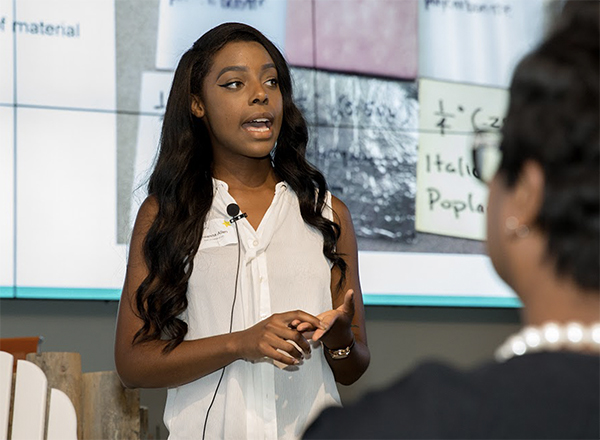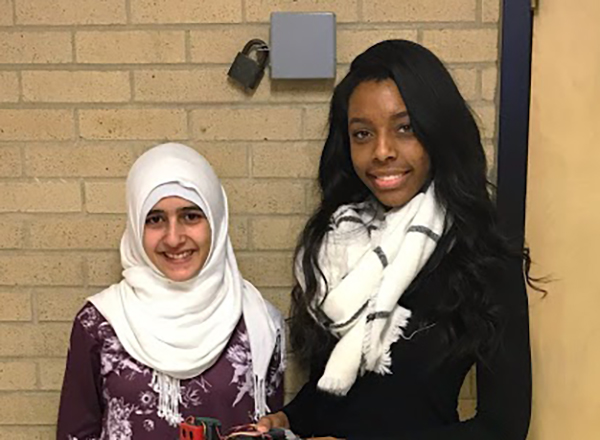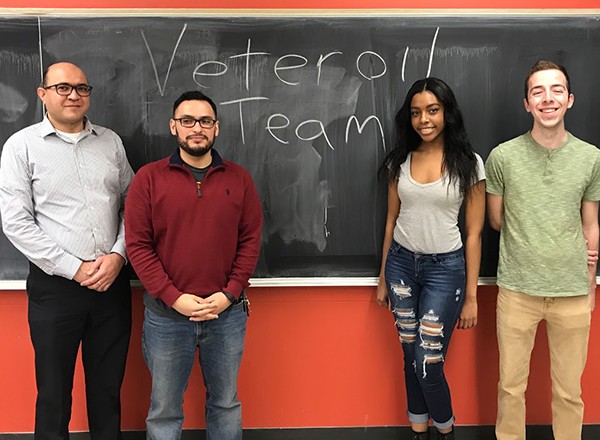Photo: Breanna Allen, center, receives her certificate of completion for the University of California-Irvine Autonomous Engineering Academy.
When Breanna Allen joined the Engineering Club at HFC, she was the only woman in the room.
“When I showed up for my first meeting, people didn’t understand why I was there,” recalled Allen. “They seemed to think I was lost or looking for someone. When I told them I was there to join the Engineering Club, everyone was surprised – even Dr. Hassan Nameghi (HFC’s chair of the pre-engineering department).”
Allen was quickly welcomed, as Nameghi took her under his wing. In the next year, she went from being the only woman in the Engineering Club to becoming the first female president of the club.
“I am grateful to Dr. Nameghi,” said Allen. “He played an invaluable role in realizing my potential, when I was just 17 years old, to become an engineer. I had a lot of doubters who didn’t believe I fit the description of an engineer. Dr. Nameghi knew I went through a lot personally and academically. He supported me and encouraged me along the way. He helped me find the best in myself.”
Her first project for the Engineering Club was building a drone.
“I loved it. It was super fun,” she said. “We worked on this drone for the whole semester. We built it, got it working, and got it to the take flight.”

Breanna Allen gives a presentation about her work

Allen is no longer the only woman in the Engineering Club. Others have since joined and taken leadership roles.
A national top-10 finish
During Allen’s presidency, the Engineering Club participated in the National Science Foundation’s Community College Innovation Challenge. The project, “Extraction of Energy from Yard Waste,” was to develop an energy extract from yard waste, essentially creating a biofuel. It was composed of biodegradable material mixed with oil. The oil enabled the fuel to burn, producing energy.
The project made it to the NSF’s “Top Ten of the Nation” in Washington, D.C. The NSF invited the 10 finalists to compete in the nation’s capital.
“Even though we didn’t win at the national level, it was an amazing experience overall. I’m glad I was a part of it,” she said. “The HFC Engineering Club had previously been small. Once word got out that we were getting invited to science competitions across the nation and were winning, people were more interested and joined us.”
Allen has also completed two internships in 2017. The first was at the University of Michigan in Ann Arbor, where she learned about the business side of engineering. Since engineers are innovators and product developers, it is essential for them to know how to work on patent applications and the legalities of the products they develop.
“It was a fun experience,” said Allen. “The goal was to teach engineering students how to be more business-oriented.”
Her second internship was at the University of California-Irvine Autonomous Engineering Academy. During the two-month program, she designed, manufactured, and built an autonomous quadcopter (also called a four-motored drone). She designed the quadcopter using Computer-Aided Design (CAD).
“It was totally hands-on. CAD was one of the most valuable things I learned,” said Allen. “That was a huge takeaway because CAD is a vital part of the engineering field today. From there, they have you actually build what you designed on CAD using 3-D printers. Building this quadcopter was probably the most fun thing I ever did as an engineering student.”
A NASA dream sets her sights on the stars
Allen knew she wanted to be an aerospace engineer for NASA ever since she was in fifth grade at River Oaks Elementary School in Dearborn. Around that age she became fascinated with NASA, space, and the planets.
“That’s been my ultimate dream since the fifth grade. I don’t see myself in any other career. I want to work at NASA and be an aerospace engineer,” she said. “I have not veered from that goal. Honestly, everything I do is to prepare for my interview at NASA.”
Allen attended Dearborn High School. As a junior, she enrolled in the Henry Ford Collegiate Academy, a partnership between HFC and the Dearborn Public Schools. The HFCA provides students with the opportunity to earn a high school diploma and then an associate degree in liberal arts or science one year later. In their junior year of high school, students begin taking courses at HFC. For the following two years, they take nearly all of their courses at HFC as they work toward their degree.
Allen earned her associate degree in general science studies in 2017. She remained on campus to earn a second associate degree in pre-engineering in 2018, while she also completed coursework at the University of Michigan-Dearborn. In early 2018, she transferred to Michigan State University, where she is completing her bachelor’s degree in mechanical engineering. When she graduates from MSU in 2020, Allen plans to enroll in a graduate program in aerospace engineering.

Allen with other members of the HFC Engineering Club, including her mentor, Dr. Nameghi (left).
Springboard to an engineering life
According to Allen, HFC gave her a solid foundation to continue her studies at MSU. The classes she took at HFC – Calculus I, II, and III, Technical Physics I and Technical Physics II – served her well when she enrolled in programming courses at MSU. In her first class, students had to design, implement, and test programs using Python, a high-level computer programming language.
“I was well-prepared by my classes at HFC. Students who didn’t take advanced calculus and physics found the MSU programming courses very difficult. I was one of the lucky ones,” she said. “The teachers at HFC were very hands-on. They took the initiative and made sure I grasped all the material and was knowledgeable about the subject when I walked away. I cannot emphasize that enough. Here at MSU, you are responsible for teaching yourself and being able to know the material yourself. HFC prepared me for that. HFC and Dr. Nameghi really molded me into an engineer. HFC was the place I found myself. I couldn’t be more grateful to be around those people.”